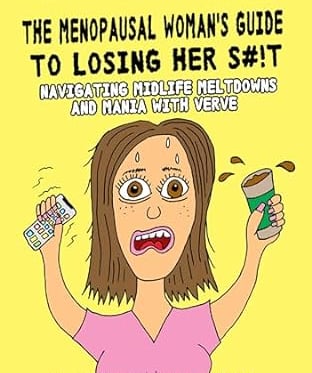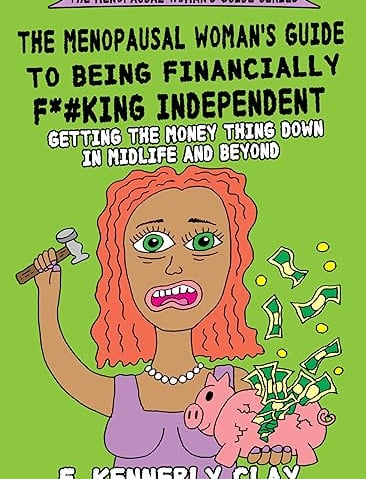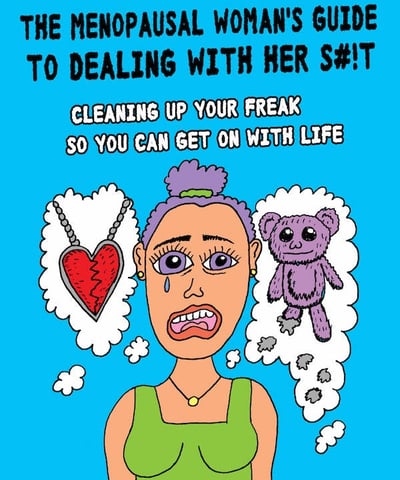Unwanted Thoughts in Menopause (& How to Prevent Them)
There is a proven correlation between increased feelings of anxiety during menopause and the potential for some women to experience unwanted thoughts.
MENOPAUSAL MENTAL HEALTHMENOPAUSAL ANXIETY
Kennerly Clay
8/8/20244 min read


Can menopause cause unwanted thoughts?
If you're feeling like you're losing your mind in menopause, yes, hormonal function could be partially to blame. Estrogen, in particular, plays a vital role in modulating neurotransmitters that affect mood, cognition, and emotions.
The reduction of estrogen levels during menopause has been linked to changes in brain function and the onset of psychological symptoms that pose challenges for mental health in menopause. Research highlights that many women experience mood swings, depression, anxiety, and even cognitive disturbances during this period. For some women, depression in menopause can lead to more seriously mental disturbances.
A study published in the Journal of Affective Disorders found a significant correlation between menopause and an increased risk of depressive symptoms. The study noted that hormonal imbalances could lead to alterations in brain regions involved in emotional regulation.
In addition to mood-related symptoms, cognitive function can also be affected. A decline in estrogen has been associated with memory lapses and difficulties in concentrating. Brain areas responsible for memory, such as the hippocampus, for example, are highly sensitive to estrogen levels. Consequently, decreased estrogen can impair short-term memory and information processing speed, leading to cognitive disturbances.
Furthermore, psychosocial factors during menopause, such as changes in family dynamics and social roles, can compound these psychological effects, making it a multifaceted issue.
If you or someone you know is in crisis, please call 988, the Suicide & Crisis Lifeline in the United States.
Menopause and unwanted thoughts: How they're connected
Research reveals a compelling connection between menopause and the onset of unwanted thoughts, with numerous studies highlighting this correlation. There's a proven correlation between increased feelings of anxiety during menopause and the potential for some women to experience obsessive-compulsive tendencies (intrusive thoughts being among OCD behaviors). Experts attribute these symptoms to the body's adjustment to new hormonal baselines, which can affect neurotransmission and brain function.
The body's adjusted hormone production impacts the neurotransmitters serotonin and dopamine, which are critical to maintaining mental balance. Disruption in these neurotransmitters can lead to heightened anxiety, obsessive thoughts, and other distressing cognitive shifts. In rare cases, women may experience delusions, considered a "break" with reality.
Other research indicates women undergoing menopause have reported a significant frequency of unwanted thoughts, often characterized by irrational fears or intrusive doubts that were not present prior to menopause. These findings provide a clear indication that the hormonal changes intrinsic to menopause can have profound effects on cognitive health, making it essential for healthcare providers to address these symptoms proactively.
It's important to note, however, that menopause itself is not necessarily correlative with unwanted thoughts and mental health issues like depression and anxiety. But rather, the symptoms of menopause, particularly vasomotor symptoms like hot flashes, along with factors such as propensity for mental health disorders (past or family history, for example) and life stressors, such as relationship with spouse, caregiving of an elder family member, or personal health issues. All of these can conspire to trigger anxiety and compulsive thinking and behavior. At the very least, it could feel like you're "going crazy" in perimenopause and beyond.
The body's adjusted hormone production impacts the neurotransmitters serotonin and dopamine, which are critical to maintaining mental balance. Disruption in these neurotransmitters can lead to heightened anxiety, obsessive thoughts, and other distressing cognitive shifts.
How to prevent unwanted thoughts in menopause
While there is no one-size-fits-all solution for anxiety, depression, and other mental disorders in menopause, many women find some relief by way of hormone replacement therapy (HRT). HRT can help balance hormones and alleviate some of the psychological symptoms associated with menopause. According to clinical guidelines, HRT may reduce the frequency of mood swings, anxiety, and depressive symptoms, thereby helping to lessen unwanted thoughts.
CBT to treat unwanted thoughts
Cognitive-behavioral therapy (CBT) is another effective intervention. CBT works by identifying and challenging negative thought patterns, replacing them with healthier, more constructive ways of thinking. Multiple studies have shown CBT to be highly effective in managing anxiety and depression, making it a valuable tool for women undergoing menopause who experience unwanted thoughts. If you're experiencing unwanted thoughts in menopause, it's imperative that you seek out a healthcare provider who can support you or can recommend a mental health therapist.
Mindfulness to help relieve intrusive thoughts
Mindfulness practices, such as meditation and deep-breathing exercises, can also play a significant role in managing these symptoms. Mindfulness can help you stay present and focused, reducing the impact of intrusive thoughts. Regular mindfulness practice has been associated with reduced stress levels and improved emotional regulation.
Lifestyle changes to help treat unwanted thoughts
Lifestyle adjustments, including a balanced diet and regular exercise, are pivotal. A nutrient-rich diet can stabilize blood sugar levels and improve mood, while physical activity has been proven to boost endorphins, decrease stress, and enhance overall mental well-being. The North American Menopause Society recommends a comprehensive approach that includes both dietary changes and physical activity to help manage your menopause symptoms holistically.
Help for unwanted thoughts in menopause
Aside from helping yourself through lifestyle and dietary modification, it's important to work with a trusted mental health provider who can help you address feelings of anxiety and unwanted thoughts. Mental health issues in menopause are common, but women often delay getting treated, sometimes leading to worsening and more troublesome symptoms.
Books for women who are losing it in menopause
Mental Health
Losing your mind in peri/menopause?
The menopausal woman's guide series
Financial Health
Had enough of financial insanity?
Personal Growth
Triggers? Old stuff kicking up?
Related topics
Explore helpful articles, tips, and advice for women who are losing their shit in menopause.
Community
Stay Connected
© 2024. Eclectic Content, Inc. All rights reserved.






